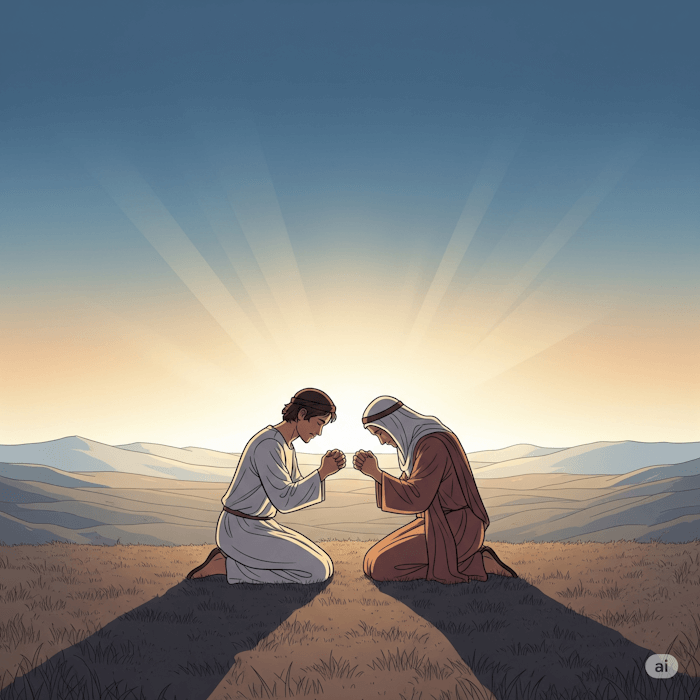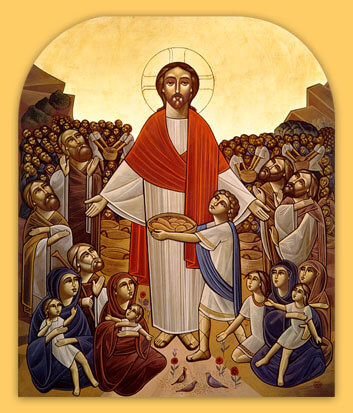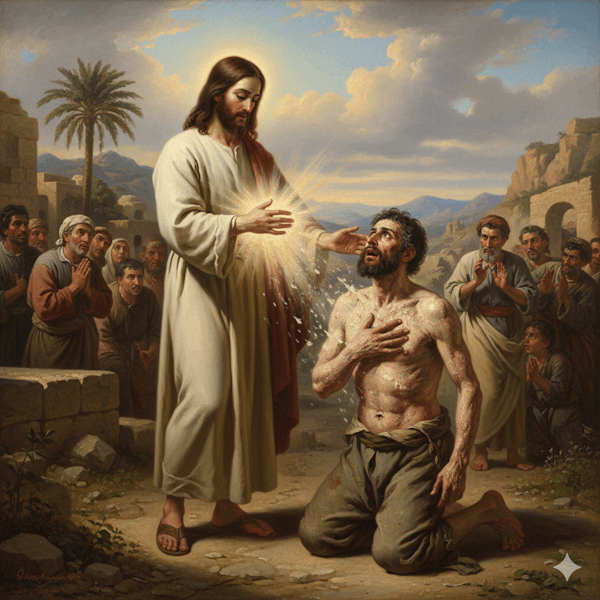Do you feel like a well that has already given all your water? People keep coming with their buckets, waiting for you to above them, but inside you are completely dry.
The exhaustion you feel goes beyond physical fatigue; It is a deep exhaustion of the soul, which turned passion into weight and joy into cynicism.
If this image describes your reality, you may be experiencing what we call burnout. For many Christians, this condition is accompanied by a layer of guilt, a whisper that says that our exhaustion is a sign of spiritual failure.
But the Bible, in its honest wisdom, shows us a God who perfectly understands our fragility.
Stress and exhaustion are not a novelty of the 21st century. In this article, we will walk together through this valley, seeking not easy answers, but the compassionate wisdom of the word of God.
Let’s discover that rest is not a luxury, but a divine commandment, and find a practical way to restore the strength and joy that comes from the Lord.
The portrait of exhaustion: contextualizing the burnout
Before we plunge into the biblical perspective, it is important to understand what burnout really is and why it affects us so integrally. It’s not just about being overloaded with work; It is a state of chronic exhaustion that attacks our being on three distinct fronts, impacting our body, our soul (mind and emotions) and our spirit.
More Than Physical Tiredness: The 3 Signs of Burnout
First, there is emotional and physical exhaustion. It’s the overwhelming feeling of being completely drained, where even sleep doesn’t seem to be enough to recharge your energies. We woke up already tired.
Second, depersonalization or cynicism arises. We begin to feel distant and negative about our work, our ministry and the people around us.
That empathy and passion we had gave way to irritability and a sense of indifference.
Finally, comes the feeling of ineffectiveness and low personal fulfillment.
Even working incessantly, we feel that our effort is useless and that we are not making the slightest difference, which generates a profound crisis of purpose.

The spiritual roots of our exhaustion
Although burnout has practical triggers, such as overwork and lack of limits, its deepest roots are spiritual. It often springs from the ground of two subtle idolatries: the idolatry of performance and the idolatry of control.
the idolatry of performance makes us seek our value and our identity in what we make. Our sense of ‘being a good Christian’ or ‘a good professional’ depends on our productivity and our results.
When we fail or we get tired, our identity collapses. The idolatry of control makes us carry the weight of the world on our shoulders, acting as if the success of everything and everyone depended on us. We assume burdens that God never asked us to carry, and inevitably, we are crushed by them.
It is critical to understand that burnout is a complex condition with real components in the body and mind.
Therefore, an act of great wisdom and good stewardship is to seek professional help.
Talking to a doctor to assess whether there are physical causes contributing to exhaustion (such as vitamin deficiencies or hormonal problems) is an important first step.
Likewise, a Christian psychologist or therapist can offer valuable tools to identify the patterns of thought and behavior that lead us to exhaustion by working in partnership with the spiritual healing we seek in God.

The Biblical Perspective
The Bible is a book written by and for real people who have experienced the full range of human emotions, including exhaustion. Although the word ‘burnout’ does not exist in the Scriptures, the experience and solution for it are present from cover to cover.
God, our creator, knows our design and left us a ‘owner’s manual’ with principles for a sustainable life.
The Sabbath Beginning
From the first page of the Bible, God establishes a rhythm: work and rest. After six days of intense creative activity, ‘on the seventh day God rested from all the work he had done’ (Genesis 2:2).
If the infinite God, who does not tire, instituted rest as the climax of his work, who are we finite creatures to ignore this pattern?
The Sabbath commandment (Exodus 20:8-11) was not an arbitrary rule, but a gift from God to mankind. It is a weekly invitation to stop, breathe and remember two fundamental truths: we are not machines, and we are not God.
The rest of the Sabbath is an act of faith, a statement that we trust that God will sustain the world and our lives even when we are not producing.
⁸ ‘Remember the Sabbath day, to sanctify it.
⁹ You will work six days and in them you will do all your work, ¹⁰ But the seventh day is the Sabbath dedicated to the Lord your God. On that day you will do no work, neither you, nor your sons or daughters, nor your servants or servants, nor your animals, nor the foreigners who live in your cities.
¹¹ For in six days the Lord made the heavens and the earth, the sea and everything that exists in them, but on the seventh day he rested. Therefore, the Lord blessed the seventh day and sanctified it.
Exodus 20:8-11 (NIV)
The example of Jesus
No one worked more intensely or with a greater purpose than Jesus. He healed crowds, taught tirelessly and was constantly surrounded by people in need.
However, the Gospels are full of moments when Jesus deliberately withdrew from the crowd to rest and pray.
We read in Mark 1:35: ‘At dawn, when it was still dark, Jesus got up, left the house and went to a deserted place, where he kept praying.’
In Luke 5:16, he says that ‘Jesus, however, he retired to lonely places and prayed.’
Jesus, being fully God and fully man, shaped us the need to balance intense service with the intentional retreat for communion with the Father.
If the very Son of God needed these recharge moments, how much more do we?

Jethro’s advice to Moses: the wisdom of delegating
In Exodus 18, we find one of the first reports of ministerial burnout of the Bible. Moses, trying to solve all the problems of the people alone, ‘sitted to judge the issues of the people, from morning to late afternoon’.
Your father-in-law, Jethro, wisely, gave you an accurate diagnosis: ‘What you are doing is not good.
Jethro’s solution was practical: to delegate. Moses should focus on the most important (teaching the word) and raising other leaders to help him carry the burden. This story teaches us the wisdom of recognizing our limits and the power of the delegation.
It is important to note that the solution to exhaustion often involves both the spiritual dimension and the practice.
While the Bible offers us ‘why’ and hope, God also grants wisdom to professionals who can give us the ‘how’.
Therapies such as cognitive behavioral (CBT), for example, can be extremely effective tools to help us apply the biblical principle of ‘mind renewal’ (Romans 12:2).
A therapist can help us identify the ‘automatic thoughts’ of performance and self-demand that lead us to burnout, and to replace them with healthier thoughts aligned with the truth of God’s grace.

Practical steps to get out of exhaustion
Leaving a burnout state is a process that requires intentionality and grace. It’s not a race, but a walk back to the rhythm that God designed for us. Inspired by biblical principles, here are some practical steps to start your restoration journey.
1. Take a radical inventory of your agenda and your ‘Sins’
The first step is radical honesty. Take a sheet of paper and list all your current commitments, tasks and responsibilities (at work, at church, at home). Now, next to each item, ask yourself honestly:
- Is this essential and only I can do? (Principle of Moses/Jetro)
- Does it give me life or drain my life?
- I said ‘yes’ to this out of genuine zeal or for fear of displeasure, out of pride or the need to feel important? brave.
2. Create rest ‘sanctuaries’ in your week
Rest needs to be more than just the time left over. It needs to be scheduled and protected. Create small ‘sanctuaries’ of rest in your routine.
daily sanctuary
It can be 20 minutes in the morning to pray and read the Bible without interruptions, or a 15-minute walk at lunchtime without a cell phone.
weekly sanctuary
Set a block of hours on your day off that is dedicated to an activity that truly restores your soul (a hobby, time in nature, a date with a dear friend). Protect this time as an unavoidable commitment.
3. Rediscover the joy of ‘doing nothing’ with purpose
Burnout is often a symptom of productivity idolatry. Healing involves the discipline of releasing simply ‘being’.
Challenge yourself to schedule time not to do ‘nothing’ productive. Sit on the porch and listen to music. Read a guilt-free fiction book. Watch your children play without feeling like they need to ‘optimize’ time.
This practice breaks the power of the performance idol and teaches us to find joy in the gratuitousness of life, which is a gift from God.
4. Relearn to ask for help and delegate
You were not created to carry everything yourself. The humility to ask for help is a spiritual superpower.
Identify a responsibility On your step 1 list you could delegate or ask for help. It can be a homework, a project at work or a role in the ministry.
Have the courageous conversation. Ask your spouse, a co-worker, a church leader for help. Express your need with vulnerability. Often, the people around us are willing to help, but they don’t because we never ask.
Build your professional support network. Remember, your final and bravest step may be to assemble your ‘restoration team’.
This includes your trusted doctor for the physical part, a good therapist or counselor for the emotional and mental part, and your pastor or a spiritual mentor for the soul part. God has given us the community in many ways; Using them is wisdom.
Conclusion: Burnout
The way to get out of the burnout is not a path of more effort, but of more surrender. It is the journey back to God’s original design for our lives: a life with rhythm, with limits and with a deep dependence onHe as our source.
The exhaustion you feel is not a sign of God’s absence, but a desperate invitation from your soul for you to return to Him. He is not idly, disappointed with his weariness. He is, as in Jesus’ invitation, with open arms, saying, ‘Come to me. I will give you rest.’
Stress and exhaustion need not be your final destination. Healing begins when we stop trying to be the hero of our own story and rest in the arms of the hero who has already won all battles for us.
“God of Peace”, a sermon by Charles Spurgeon
For your final meditation, listen to this mighty Charles Spurgeon’s Sermon about the true and lasting peace that only God can offer.
Play and be blessed!
- Aroer – 10 de October de 2025
- Aijalom of Zebulun – 10 de October de 2025
- Aijalom of Dan – 10 de October de 2025